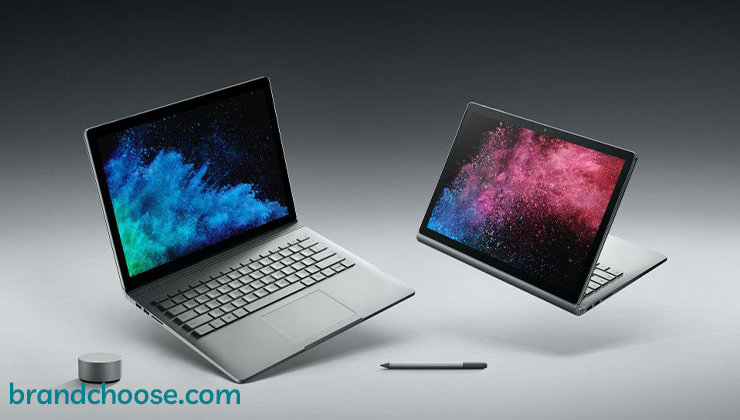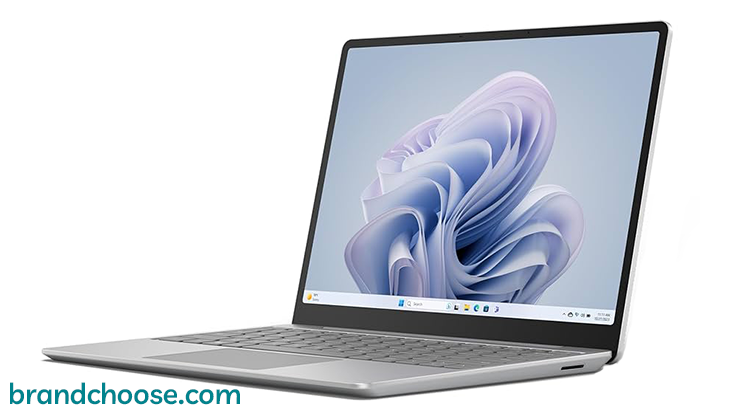Highlights
Premium hybrid designs – Surface series combines laptops and tablets
Touchscreen optimization – Seamless with Windows touch features
High build quality – Sleek, durable & easy to carry
Innovative features – Detachable keyboards and pen support
Expensive but high-quality – Focus on premium materials
Long battery life – Especially in Surface Pro and Laptop
Focus on creativity and productivity – Popular among professionals
Microsoft, a trailblazer in software innovation, extends its expertise to hardware with its Surface lineup of laptops. Designed to seamlessly integrate with the Windows ecosystem, Microsoft laptops redefine productivity and creativity with their sleek design, versatile functionality, and cutting-edge features. This article delves into what sets Microsoft laptops apart, their strengths and weaknesses, and the effectiveness of Microsoft's marketing strategies.

Product Selection
3.5 /5
Microsoft offers a diverse product selection in the laptop category, ranging from traditional laptops to 2-in-1 convertible devices. Their Surface line, which includes the Surface Pro, Surface Laptop, Surface Book, and Surface Go, caters to various user needs and preferences. The Surface Pro is a versatile 2-in-1 detachable device that is lightweight and portable, while the Surface Laptop is a more traditional laptop that offers robust performance. The Surface Book is a high-end laptop with a detachable screen, and the Surface Go is a budget-friendly option that doesn't compromise on performance. The latest technologies are incorporated into Microsoft's laptops, such as the 10th generation Intel Core processors, high-resolution PixelSense touch displays, and advanced graphics options. They also feature Windows 10, with seamless integration with other Microsoft products and services. Additionally, while the Surface devices are praised for their build quality and performance, they are not as customizable as some competitors' offerings. Despite these cons, Microsoft's product selection stands out for its innovative designs and high-quality, reliable performance.
Affordability
3.0 /5
Microsoft offers a diverse range of laptops, each priced according to their specifications, design, and features. The Surface line, for instance, includes the budget-friendly Surface Go, the mid-range Surface Pro, and the premium Surface Book. The Surface Go starts at around $400, making it an affordable option for those on a budget. The Surface Pro, on the other hand, starts at around $800, offering a balance between price and performance. The Surface Book, Microsoft's top-of-the-line offering, starts at around $1,500, delivering high-end performance and features for professional users. In comparison to other brands, Microsoft's laptops are competitively priced. For instance, the Surface Pro is priced similarly to Apple's MacBook Air, but offers a touch screen and the ability to convert into a tablet, features not available on the MacBook Air. However, a potential downside of Microsoft's pricing strategy is that it can be somewhat confusing for consumers, with significant price jumps between models and additional costs for accessories like the Surface Pen or Type Cover. Despite this, Microsoft's laptops offer a good balance of price and performance, making them a viable option for a wide range of users.
Reputation
4.0 /5
Microsoft, as a brand in the laptop category, has a solid reputation for delivering high-quality and innovative products. Their Surface line of laptops, for instance, has been widely praised for its impressive design, high performance, and advanced features. The Surface Pro 7, for example, features the latest 10th Gen Intel Core processors, a high-resolution PixelSense Display, and a versatile design that allows it to function as both a tablet and a laptop. Microsoft's laptops are also known for their robust security features, including Windows Hello face recognition and BitLocker device encryption. However, Microsoft's reputation in the laptop category is not without its drawbacks. Some users have reported issues with reliability and customer service. Additionally, while Microsoft's laptops are generally praised for their innovation, they are often compared to Apple's MacBook line, which some users prefer for its sleek design and user-friendly interface. Despite this, Microsoft continues to be a strong player in the laptop market, consistently introducing new technologies and features to compete with other top brands.
Customer Support & Warranty
4.0 /5
Microsoft's customer support for its laptop range is commendable and has been appreciated by many users worldwide. The company provides multiple channels for support, including phone, chat, email, and even social media, making it easier for customers to reach out whenever they encounter issues. They also offer a comprehensive online support portal that includes a vast library of troubleshooting guides, FAQs, and community forums where users can find solutions to common problems. Microsoft has also incorporated AI technology into its support services with a virtual assistant that can help answer basic queries and guide users through simple troubleshooting steps. However, while Microsoft's customer support is generally reliable, it's not without its drawbacks. Some users have reported long wait times to connect with a support representative, particularly during peak hours. There have also been instances where the support team's solutions were not effective, requiring the user to seek help multiple times for the same issue. In comparison to other brands like Apple and Dell, Microsoft's customer support is considered to be on par in terms of responsiveness and problem-solving capabilities. However, Apple's customer support is often praised for its efficiency and the high level of technical knowledge of its representatives, while Dell's proactive support service, which identifies and begins resolving issues before they become problems, sets it apart in this aspect.
Battery Life
4.0 /5
Microsoft has made significant strides in the laptop category, particularly in terms of battery life. The latest models of Microsoft Surface laptops, for instance, boast an impressive battery life that can last up to 15.5 hours on a single charge, depending on the model and usage. This is largely due to the efficient power management system and the latest Intel processors that the brand uses in its laptops, which are designed to optimize battery performance. However, while Microsoft's battery life is commendable, it's worth noting that it can vary significantly depending on the specific activities being carried out on the laptop. Intensive tasks such as video editing or gaming can drain the battery faster. In comparison to other brands, Microsoft's battery life is competitive. Brands like Apple and Dell offer similar battery life in their high-end laptops, but Microsoft manages to edge out some competitors in the mid-range market. However, some users have reported that the battery life of Microsoft laptops tends to decline over time more rapidly than some other brands. This is a common issue with many laptop brands, but it's worth considering when comparing Microsoft to its competitors.
Display
4.5 /5
Microsoft has made significant strides in the display technology for its line of laptops, particularly with the Surface series. The Surface Laptop 3, for instance, features a vibrant PixelSense Display with interactive touchscreen. The display is available in two sizes - 13.5” and 15”, with resolutions of 2256 x 1504 pixels and 2496 x 1664 pixels respectively, resulting in a high pixel density that ensures crisp and clear images. The 3:2 aspect ratio is ideal for productivity tasks and the display also supports 10-point multi-touch, enhancing user interaction. However, while the display quality is generally impressive, it falls short in terms of brightness when compared to some competitors, such as Apple's MacBook Pro. The Surface Laptop 3's display reaches a maximum brightness of around 400 nits, while the MacBook Pro can reach up to 500 nits. This could be a drawback for users who often work in brightly lit environments. Additionally, Microsoft laptops do not offer OLED display technology, which is offered by some other brands like Dell and HP, and is known for its superior contrast and color accuracy. Despite these cons, Microsoft's display technology is still highly competitive, offering a high-resolution, touch-enabled display that is not commonly found in many laptops in the same price range.
Performance
4.5 /5
Microsoft has made significant strides in the laptop market, particularly in terms of performance. Their Surface lineup, which includes the Surface Pro, Surface Laptop, and Surface Book, is powered by the latest Intel Core processors, providing users with a robust performance that can handle a wide range of tasks. The Surface Pro 7, for instance, uses a 10th Gen Intel Core processor and can be configured with up to 16GB of RAM and 1TB of SSD storage. This makes it ideal for multitasking, running demanding applications, and even some light gaming. However, while Microsoft laptops generally offer excellent performance, they can fall short in terms of graphics capabilities compared to other brands like Apple and Dell, especially for more graphically intensive tasks. The integrated graphics in most Surface models may not be sufficient for heavy-duty gaming or professional-grade video editing. Moreover, although Microsoft's performance is competitive, some users might find the high-end configurations to be quite pricey. In comparison to other brands, such as Lenovo and HP, Microsoft tends to offer less variety in their laptop range, particularly for those seeking more affordable options. Despite these drawbacks, Microsoft's focus on performance in their Surface lineup makes them a strong contender in the laptop market.
Design & Style
4.5 /5
Microsoft’s Surface lineup is known for its clean, elegant design, featuring premium materials like magnesium and a focus on slim, lightweight builds. The Surface Pro and Laptop models emphasize simplicity and versatility, balancing function with style.

Conclusion
Microsoft laptops redefine productivity and creativity with their seamless integration with the Windows ecosystem, innovative design, and versatile functionality. While facing challenges such as pricing and repairability, Microsoft's commitment to innovation and user experience ensures its continued relevance and success in the competitive laptop market. With effective marketing strategies and a dedication to empowering productivity, Microsoft laptops empower users to accomplish more, wherever they go.





